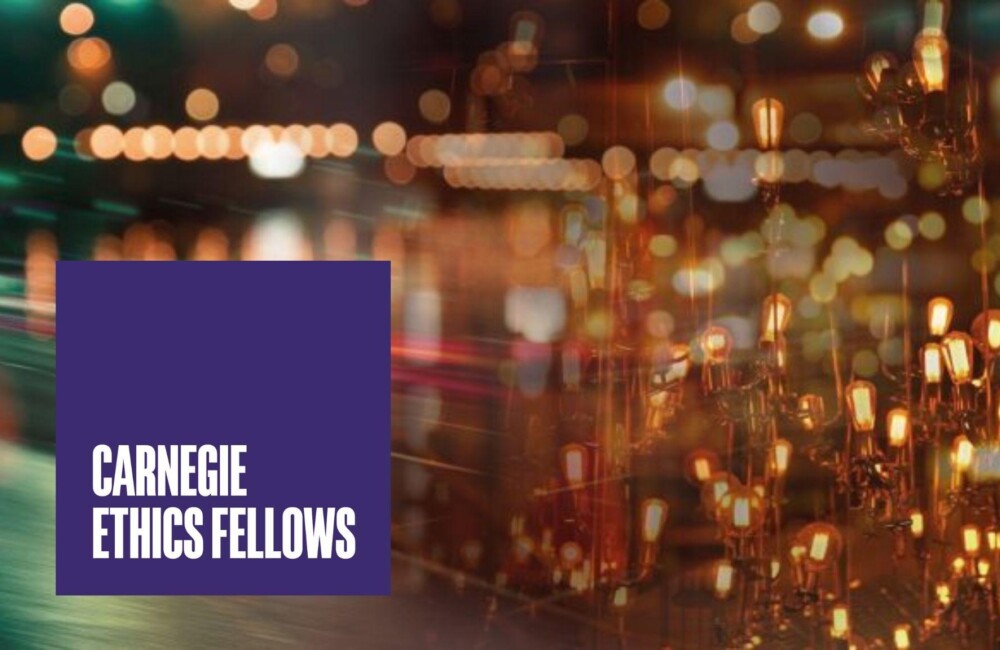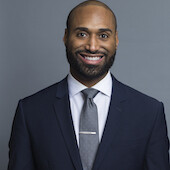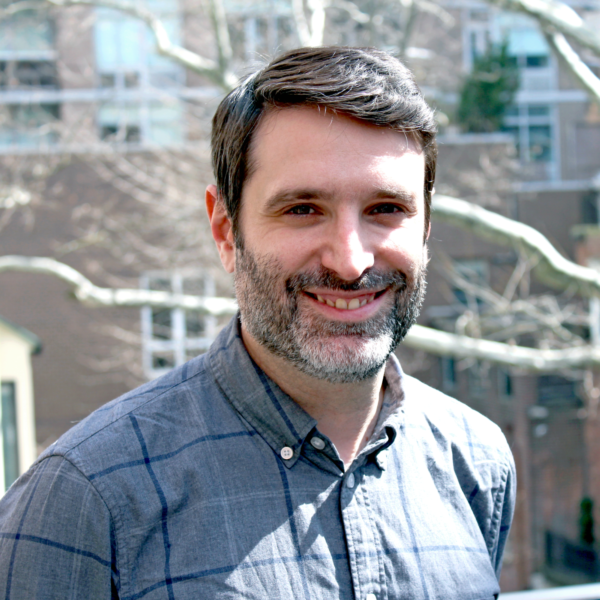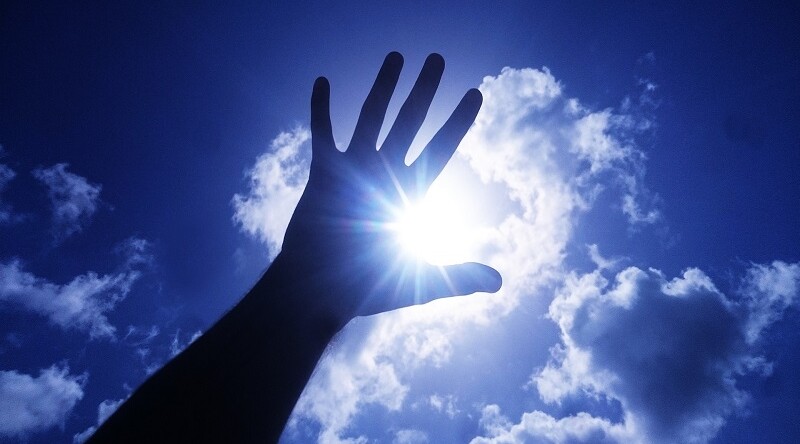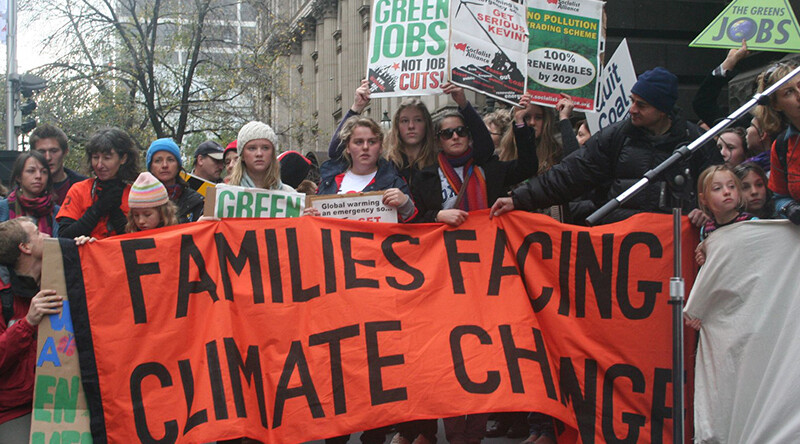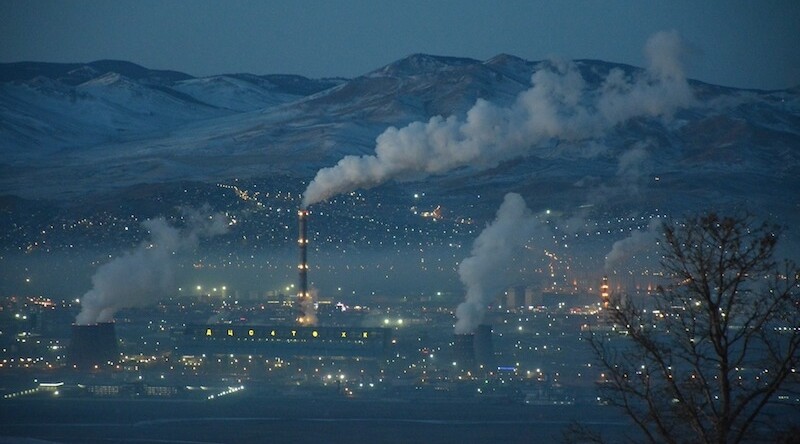Ahead of the Climate Strike rallies on September 20, Bard College's Brian Mateo discusses the Climate Reality Project, founded by Vice President Al Gore, and how it has informed his work regarding environmental activism and education. Why has Greta Thunberg's Climate Strike been so successful? How can protests turn into concrete policies?
ALEX WOODSON: Welcome to Global Ethics Weekly. I'm Alex Woodson from Carnegie Council in New York City.
This week, I'm speaking with Brian Mateo, associate dean for civic engagement at Bard College and director of strategic partnerships at the Bard Globalization and International Affairs program in New York City. He is also a Carnegie New Leader and a Carnegie Council trustee.
Brian recently became a Climate Reality Leader after training with Vice President Al Gore and the Climate Reality Project for three days in Minnesota last month. We talked about his training, how it shaped his ideas about climate change activism, and how to get through to climate change deniers.
Next week on September 20, Brian will be taking part in a Climate Strike protest at the United Nations, led by Swedish teenager and activist Greta Thunberg. This will be happening ahead of Climate Week and the General Assembly sessions. Brian gave a few more details about the rally and he spoke about how he hopes to turn these protests into concrete policies.
For more, Brian wrote an article last spring about links between climate change and education.
In addition, you can find recent podcasts with Senior Fellows Nikolas Gvosdev, on climate change and foreign policy, and Kavitha Rajagopalan on the Chennai water crisis and some of the problematic media narratives about environmental issues.
For now, here’s my talk with Brian Mateo.
Thank you so much for coming, Brian. Great to see you.
BRIAN MATEO: Thank you for having me, Alex.
ALEX WOODSON: Of course. We're going to talk your work with the Climate Reality Project. For our listeners who don't know about the Climate Reality Project or who might have just heard the name, what is it exactly? How would you explain it?
BRIAN MATEO: It started in 2006 by Nobel laureate and former U.S. Vice President Al Gore, and it is dedicated to catalyzing a global solution to the climate crisis.
A part of the Climate Reality Project are Climate Reality Leaders. As of today, there are 19,000 leaders in 154 countries who are working in their communities trying to affect policy and trying to innovate and educate others in order to join the movement.
ALEX WOODSON: You recently went through the Climate Reality training to be a Climate Reality Leader. Why did you decide to do this training? Why was this something that was important to you?
BRIAN MATEO: As an educator, I am very passionate about how climate change is affecting our students' educational pursuits. In 2017, when Hurricane Maria affected Puerto Rico, I started to see how the prolonged power outages could affect students' graduation rates and could affect students' learning, so I started to research those trends. In April of 2019 Carnegie Council published an article that I wrote about the ethical implications of climate change for education.
After that, I started to do presentations about it. I stumbled upon the Climate Reality Project, and I realized that if I wanted to have a stronger voice I needed to be more well-versed in climate change and the solutions and also the scientific facts of it, so that's why I applied.
ALEX WOODSON: Great. We'll get to some of that a little bit later, but first I want to hear a little bit about this training. You went to Minneapolis-St. Paul for the summer training. I know you can't talk about everything, but just in a general sense what does this training entail? What did you do there?
BRIAN MATEO: You meet with other Climate Reality Leaders from around the world, and you're assigned a mentor, who helps you and is assigned to work with you throughout the training and beyond. Vice President Al Gore goes through the scientific facts of climate change and how it's affecting the world. The cool thing about it is that he focuses on specific facts in the region that we're in.
Some of the fascinating parts that I learned from him were about environmental racism: How do we include people of color, and how do we include indigenous people in the conversation of climate change but also heal these communities that have been affected? I found that fascinating because for me, I'm constantly thinking of, Who is not at the table, and how can we bring them there? The fact that he was talking about it so candidly made me feel like I was at the right place.
ALEX WOODSON: Talk a little bit more about that if you can. Al Gore has been such a huge figure in the climate change debates for years. What was it like to be in the room with him and hear this presentation? Did you come out of this being more hopeful, or was it just, "Oh, my god. This problem is so much worse than I even thought it was before"? What did you feel after hearing the presentation with Al Gore?
BRIAN MATEO: He's such a charismatic speaker. The issue is as bad as we think, but there are manageable and tangible things that we can do, and he breaks it down.
I was super-nervous when I started hearing about the "signs of climate change, oh, no!" But the figures, and the ways that he taught us how to speak about [climate change] makes me feel comfortable to be able to talk to other people. That's what I liked about it: How do we get everyone on the same page and give them points of departure?
So, now that you've heard this conversation, how can you do more research? How can you go and affect change or even work with policymakers? I found it really fascinating that he, throughout his years and training, has found a way to make what he's teaching an effective tool for other people to be able to use it.
ALEX WOODSON: Did something like climate change denialism come up during the training? One thing that I really struggle with is seeing blatant examples of that and just not really knowing how to react because it doesn't seem like people are paying attention to science; people aren't paying attention to facts. Did the training give you any strategies on how to deal with something like climate change denialism, how to talk to people who have views that are so different than yours?
BRIAN MATEO: Yes, it did. For me, what I realized is that climate change deniers are also people just like us, and we have to meet them where they are.
As an educator, for example, I have to be comfortable with my students having tension because that's where their learning is happening. When giving examples of climate change, you have to also do your research before you speak to people who are climate deniers because you want to find specific examples of how it's affecting them, or even what's in it for them.
For example, if I'm in New York City and I'm talking about deserts—we don't live in an environment where there are deserts, so it sounds very abstract for people. But if I start talking about the New York City Harbor and the rising sea level and talking about the hurricanes that have affected New York City, people are more willing to listen. So, we need to find a way to package our message for specific people.
The other part of it, too, is that research is showing that there is such a thing as "climate anxiety." People get paralyzed from hearing so much about climate change. Sometimes climate anxiety is affecting people who have been affected by climate change.
You also have "climate fatigue." You're hearing so much of, "Oh, climate change," and "The world is ending," and all these other things, and it also is difficult for people to be able to think about, What can I do?
So, when you think about change, it's easy to say, "Look, I change one thing from A to B," but when it comes to climate change, we're like, "Oh, if our ozone layer or our atmosphere is not equipped to help us because of the emissions that we're putting up in the air, then what can I do?" So, having people come up with tangible solutions also helps to do that.
ALEX WOODSON: Now that you have this training—I guess it was about a month ago, the training program—what have you done with it, and what are you planning to do with it?
BRIAN MATEO: I've been talking to different people about climate change, including policymakers. I'm also trying to find ways to work with places like libraries and museums and come up with educational materials that they can work with. One of the things that I'm doing as well is that I'm also presenting to students about climate change and its solutions.
For example, one of the recent presentations that I did was a webinar in Yerevan, Armenia, where I talked to students who are doing great work on waste management and recycling. I specifically met a student this summer, when I was working on a U.S. public diplomacy program cost study of the U.S. institutes, that launched a project called Zero Waste Communities, and in collaboration with another projected called Eco Aghb. They went and did a huge cleanup in Armenia, and they actually saved and recycled three tons of materials. So, they invited me to speak about climate change and education to help students understand about how climate change is affecting them.
On September 20, I will be partnering with the United Nations Association of the United States of America (UNA-USA) to do a climate activist training to train students about how to speak about climate change, what are some things they can do to be more effective, and then after that we're going to the United Nations to do a climate change protest led by Greta Thunberg.
ALEX WOODSON: I definitely want to get to that, but I'm curious to hear what students in Armenia think about climate change. When you were doing this webinar, were you able to get a sense of what they felt? Did they remind you of students in America or other countries, or was there really a kind of difference that you noticed?
BRIAN MATEO: Students all over the world are interested and want to find ways to work around this because they're living in communities that are being affected by it. What I find fascinating is that it's the youth that are coming up and saying, "Hey, what can we do now? How can I be helpful? How can I get to the streets and either recycle or work to make my community a better place?"
One thing that leaders need to understand is that the youth of today will be the voters and the leaders of tomorrow. So, how do we find ways to work together, because if leaders today are resistant on creating comprehensive sustainable solutions, they're going to risk getting voted out. What gives me hope is that people like Greta Thunberg, students in Armenia, and students that I work with here in the United States are being proactive, and eventually they're going to be the ones who are going to be leading the charge and running their countries.
ALEX WOODSON: This Greta Thunberg story—it has been fascinating to see how that has developed and stayed a big story. What is it about that that has made that movement so successful, do you think? In your work with the Climate Reality Project, being around students, what about that specifically has made that such a successful initiative?
BRIAN MATEO: I think what has made it a successful initiative is that it involves all of us. For example, a 10-year-old can start talking to their parents about climate change just as a scientist can do presentations and can do research about it. So, it's taking all of us.
Finally, people are stepping up and saying, "Enough." We've seen that in different movements in America as well, for example, with the civil rights movement or the women's rights movement, and LGBTQ rights. We're starting to see people taking the lead and a stand and being affected by it because the narrative is changing. More and more people are waking up. More and more people are trying to find ways that they can get involved.
When I spoke previously about climate fatigue, when you see Greta Thunberg doing a great job and excelling, that inspires others, which will be a catalyst. So, there's this effect that's going on that finally people are paying attention. You're seeing, for example, just this last week there was a town hall meeting on CNN dedicated just to climate change. That is not an anomaly. It's because the conversation is out there.
What I would love people to do is to make that energy into action. Work with your local communities: How do you create policies? How do you work with people who are not at the table or who are disenfranchised to get them involved as well and show them that they also need to understand that it takes all of us in order to solve the climate crisis?
ALEX WOODSON: You'll be doing this rally on September 20 with Greta Thunberg and probably a lot of other people. Then, the week after is Climate Week. The UN General Assembly is in session. What are you going to do to keep the momentum going during that week?
BRIAN MATEO: What I would love to do is continue to work with my students and teach them about climate change and how to be able to be effective leaders within the movement. I would like to continue working with the students that I work with and working with people around the world who are trying to affect change, continue to do the presentations from the Climate Reality project, and also begin to work with policymakers to come up with comprehensive policy reform.
ALEX WOODSON: What would be some policy reforms that you'd like to see? These strikes are great—and you're right, they've really garnered a lot of attention from the press and the general public about climate change—but the next step after that is changing policies and really changing the way people act, the way governments act, the way society really acts. What are some policies that you think are important to be the next step of these climate strikes?
BRIAN MATEO: Me personally, one thing I'm really interested in is protecting the people who have been affected by climate change. There are a lot of climate migrants around the world. In 2018 over 260,000 people in Afghanistan were displaced because of a drought, and the United Nations reported that the drought displaced more people than the Taliban conflict.
Here in the United States we also have climate migrants. You look at Alaska, you look at Louisiana, Puerto Rico and Hurricane Maria. People are getting displaced.
In Central America there are farmers in Guatemala, El Salvador, and Honduras who are risking their lives and their families' lives because of drought and because of erosion to come to the United States border to try to get a better sustainable living.
We're seeing so many people who are forced to leave their habitats and their homes because of climate change, and they don't really have legal protection. I want to know how world leaders are going to work with this because a 2014 report from the U.S. Department of Defense called climate change a "threat multiplier." What that means is that climate change is not necessarily causing these issues, but it's exacerbating the issues that are currently happening.
Going back to climate deniers, sometimes I feel like climate is like, "Oh, everyone's blaming everything on climate change." But once they start to realize that the issues that we haven't solved today are going to get worse because of our changing climate, I think that will give them a reason to believe more and understand the facts.
ALEX WOODSON: Just to go back to the Climate Reality training, what kind of people were training alongside you? Was it a lot of people in education? Was it people from various industries? I don't know if you talked about politics much; maybe there was a mix of people on the political spectrum. What kind of people were you training alongside?
BRIAN MATEO: People from all over the world, all different ages, people who were students, people who were educators, scientists, activists, people who started their own non-governmental organizations (NGOs). It was such a wide variety of people that provided such a rich conversation.
It showed that it takes all of us because the scientist who is working on climate change may have the facts, and then as an educator I can use those articles to be able to work with my students. My students themselves can then go to their parents and talk about climate change. So, it takes all of us. Anyone can apply. The level of experience varied.
ALEX WOODSON: Do you keep in touch with them? Is that part of the training, afterward to keep in touch with everyone and figure out how you're going to work together?
BRIAN MATEO: Yes. Once you're trained, you're accepted into a hub, where all of the information that we learned is housed. We connect with each other. We ask questions. Whenever I'm doing presentations and I want to know something from a specific region, I will say, "Hey, does anyone have any information about this?"
The staff of the Climate Reality Project is super-supportive. They respond right away. If you cannot find presentations or you cannot find leads to be able to work on your own projects, they also help as well, so I found it to be a very supporting and welcoming community.
As I mentioned before, I have a mentor, and I communicate with my mentor regularly. I've also met other Climate Reality Leaders who I'm working on other projects with, and I've also seen them present or seen them do live podcasts. For example, with the CNN town hall, there were Climate Reality Leaders there.
ALEX WOODSON: Oh, cool.
BRIAN MATEO: It was fascinating to see that we're all over the place and that the training that we gained is actually being put into effect.
ALEX WOODSON: When you see things like the CNN town hall or just see the general political discourse, do you have a different perspective on it after the Climate Reality training?
BRIAN MATEO: I do have a different perspective because I'm looking at it from a holistic side. I'm thinking about the training and how in depth Vice President Al Gore and the people he invited to speak to us went. Sometimes I feel like the conversation is only about emissions, and there's so much more than that.
I want to be able to see politicians and world leaders talk more about the people who are being displaced, talk more about food scarcity, talk about how we're building communities. Lowering emissions is very important, but that's not the only driving part of the conversation. I would like to see more of that.
ALEX WOODSON: One final question: Do you look to past movements like the civil rights movement or like the Indian independence movement, the fight against apartheid—do you draw inspiration from those in your climate change activism, or do you think this is just a fundamentally different type of activism that's needed because obviously the problem is quite different than fighting for equal rights for humans?
BRIAN MATEO: That's an excellent question. The way I will start with responding would be that climate change has no borders. We just talked about climate migration; we talked about how that is affecting different communities. What's interesting is that everyone is getting involved in that way. Other movements were for specific people and specific rights and things like that, which then transformed and inspired other communities.
But for here we have all the communities trying to work on one movement to make change, so it's kind of like going from macro to micro in a way, in my opinion. There are a lot of inspirations that you can draw from it as well because ultimately people want rights, they want laws to be changed, they want the system to be changed, and they want to be heard.
So, thinking about how people are going about with the climate strikes and things like that, there are many similarities with previous movements, and movements build upon each other. The civil rights movement helped make way for the women's rights movement, and so on. Our society changes. History changes.
Now we're thinking about climate. What's going to be the next emerging issue that's coming up, and how are they going to draw inspiration from previous movements?
ALEX WOODSON: I guess the difference in this is that it's going to affect all of us. We really do all have to work together, or it's not going to work.
BRIAN MATEO: Just one other example of how movements evolve: For example, the civil rights movement and the climate change movement are coming together because of environmental racism, because of healing of communities, because of teaching communities about the climate crisis. So, you're also seeing movements kind of converge, which for me is a good thing.
ALEX WOODSON: That's pretty much all my questions. Anything else you wanted to go over?
BRIAN MATEO: I would encourage anyone who would like to become a Climate Reality Leader to strongly consider applying. It's an amazing program with very welcoming people. I have been so honored to have learned from Vice President Al Gore and to be able to have a platform to help affect change.
ALEX WOODSON: We'll have links to the Climate Reality Project on our website. We'll have a transcript of this talk, and you can learn more there.
Thank you so much, Brian.
BRIAN MATEO: Thank you so much, Alex.
